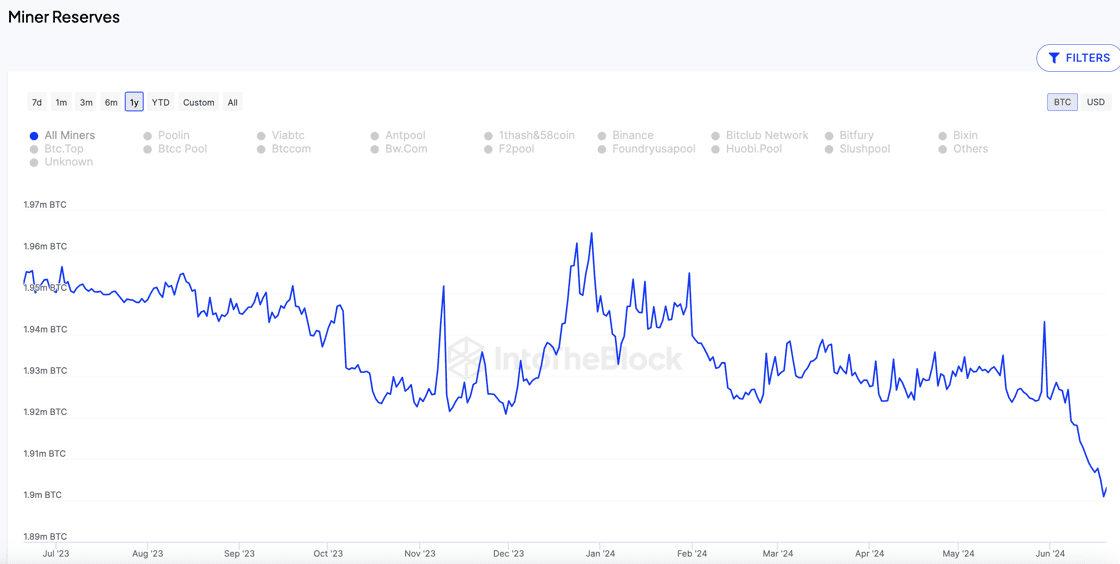Crypto Miners Have Sold Bitcoin for $2 Billion Since the Beginning of the Month
24.06.2024 7:00 1 min. read Kosta Gushterov
Bitcoin miners have sold $2 billion worth of BTC since the beginning of June, the fastest sell-off in more than a year and bringing the total to a 14-year low.
Bitcoin miners have sold $2 billion worth of BTC since June, the biggest sell-off in more than a year and leading to a 14-year low. This substantial sell-off has caused turmoil in the market and raised concerns about the leading cryptocurrency’s short-term price action.

Several factors are causing this pullback, including the recent halving event and the significant decline in profitability. After the halving, increased costs pressured miners to sell.
Despite positive news, such as Microstrategy’s purchase of nearly 12,000 BTC, Arthur Hayes’ bullish forecast and Michael Dell’s support, Bitcoin’s price action remains weak, trading at $62,600 at the time of writing.
Miners’ reserves have declined by 50,000 BTC since the beginning of the year, reflecting financial distress.
Adding to the pressure on the market is the fact that the German government recently sold around 3,000 BTC, with a further 47,000 BTC reportedly to be sold.
Market speculation suggests a cap on Bitcoin prices in the short term, but predicts a bullish trend towards the end of the year. Large call option sales expiring within a month and aggressive buying for the September to December period indicate expectations of a summer consolidation followed by a bull rally.
-
1
Metaplanet Raises $515M in First Step Toward Massive Bitcoin Accumulation
25.06.2025 20:00 1 min. read -
2
Trump-Linked Truth Social Pushes for Bitcoin-Ethereum ETF as Crypto Strategy Expands
25.06.2025 19:00 2 min. read -
3
Bitcoin Hashrate Declines 3.5%, But Miners Hold Firm Amid Market Weakness
27.06.2025 21:00 2 min. read -
4
Bitcoin’s Price Closely Mirrors ETF Inflows, Not Corporate Buys
26.06.2025 11:00 2 min. read -
5
Crypto Company Abandons Bitcoin Mining to Focus Entirely on Ethereum Staking
26.06.2025 20:00 1 min. read
Bitcoin ETFs See $1B Inflow as IBIT Smashes Global AUM record
Spot Bitcoin ETFs recorded a massive influx of over $1 billion in a single day on Thursday, fueled by Bitcoin’s surge to a new all-time high above $118,000.
Bitcoin Outlook: Rising U.S. Debt and Subdued Euphoria Suggest More Upside Ahead
As Bitcoin breaks above $118,000, fresh macro and on-chain data suggest the rally may still be in its early innings.
Analysis Firm Explains Why Bitcoin’s Breakout Looks Different This Time
Bitcoin’s surge to new all-time highs is playing out differently than previous rallies, according to a July 11 report by crypto research and investment firm Matrixport.
Bitcoin Reaches New All-Time High Above $116,000
Bitcoin surged past $116,000 on July 11, marking a new all-time high amid intense market momentum.
-
1
Metaplanet Raises $515M in First Step Toward Massive Bitcoin Accumulation
25.06.2025 20:00 1 min. read -
2
Trump-Linked Truth Social Pushes for Bitcoin-Ethereum ETF as Crypto Strategy Expands
25.06.2025 19:00 2 min. read -
3
Bitcoin Hashrate Declines 3.5%, But Miners Hold Firm Amid Market Weakness
27.06.2025 21:00 2 min. read -
4
Bitcoin’s Price Closely Mirrors ETF Inflows, Not Corporate Buys
26.06.2025 11:00 2 min. read -
5
Crypto Company Abandons Bitcoin Mining to Focus Entirely on Ethereum Staking
26.06.2025 20:00 1 min. read

